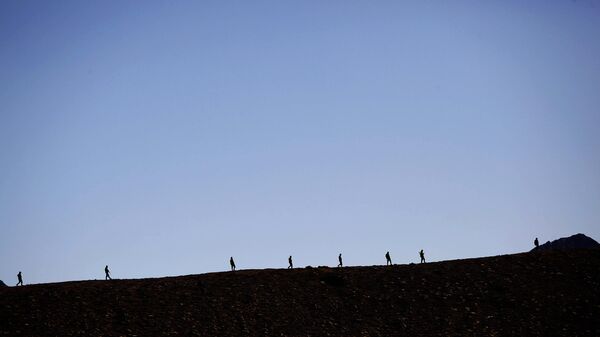India has strongly conveyed to China to stop interfering in its internal affairs, while noting the situation in Aksai Chin.
Indian Foreign Ministry spokesperson Raveesh Kumar said on Thursday that any changes in administration in the state of Jammu and Kashmir, and Ladakh is an entirely “internal matter”.
“The matter of reorganisation of erstwhile state of Jammu and Kashmir into the Union Territory of Jammu and Kashmir, and Ladakh is entirely an internal affair of India. We do not expect other countries including China to comment on the matter which is internal to India; just as India refrains from commenting on internal issues of other countries", the spokesperson said during a press briefing while replying to a comment made by the Chinese foreign ministry.
China's reaction came as the state of Jammu and Kashmir ceased to be a state and became two Union Territories – Jammu and Kashmir and Ladakh – Wednesday midnight.
“China deplores and firmly opposes that (move). India unilaterally changes its domestic laws and administrative divisions challenging China’s sovereignty. This is unlawful and void and this is not effective in any way and will not change the fact that the area is under actual Chinese control", Chinese foreign ministry spokesperson Geng Shuang said.
The administrative status of the state changed after the Indian Parliament abrogated the Article 370, providing special status to the former state.
India, for its part, has accused China of the “illegal occupation of large tracts of areas in the union territory of Jammu and Kashmir, and Ladakh" claiming that "it has illegally acquired Indian territories from Pakistan-administered Kashmir under the China-Pakistan Boundary Agreement of 1963.”
In so far as the boundary question is concerned, India and China have agreed to seek fair and reasonable and mutually acceptable solutions to the issue through peaceful consultations on the basis of political parameters and guiding principles that were agreed upon in 2005.
Aksai Chin or the Shaksgam Valley is part of the Hunza-Gilgit region of Pakistan-administered Kashmir, and is a disputed territory claimed by India but controlled by Pakistan. It borders the Xinjiang Province of China to the north, the northern areas of Pakistan-administered Kashmir to the south and west, and the Siachen Glacier region to the east.
The Shaksgam Valley was ceded to China by Pakistan in 1963 when both countries signed a boundary agreement to settle their border differences. However, Article 6 clearly stated that “the two Parties have agreed that after the settlement of the Kashmir dispute between Pakistan and India, the sovereign authority concerned will reopen negotiations with the Government of the People's Republic of China, on the boundary as described in Article Two of the present Agreement, so as to sign a formal Boundary Treaty to replace the present agreement".
Border disputes have often accompanied periods of high tension between the People's Republic and India over the Ladakh region. In 1962, a border dispute over Aksai Chin, which India claimed as part of the Ladakh region, saw open hostilities between the People's Liberation Army and Indian military, with thousands killed in a one-month period. Similar incidents occurred on a smaller scale in 1967 and 1987.




